DEE DEE BRIDGEWATER / “La Belle Vie”
First things first: I am not a fan of French music, French lyrics. I just don’t vibe with it, which is why I put off listening to J'Ai Deux Amours for as long as I did. But now that I have, well, je parle francais.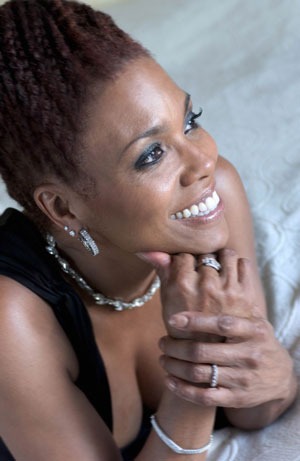
This is everything I’m generally not suppose to like. A concept album built on French songs that have become popular in their English versions. One exception is “Dansez Sur Moi (Girl Talk),” an American jazz standard that became popular in France once fitted out with French lyrics.
On top of that, the arrangements are done up in French Café style—a quiet acoustic quartet: accordian, guitar, bass and light percussion. An unjazzy quartet if there ever was one. On top of which, the musicians were steeped in European music.
This was almost certainly going to be a turn off, or so I thought. Oh, yeah, one more thing. I had copped Dee Dee’s 1974 debut album, Afro Blue. Now that was a killer. Hip arrangements. Dee Dee singing her heart out. I was in love with that. Everytime I thought about listening to J’Ai Deux Amours, Afro Blue just wouldn’t let me do it.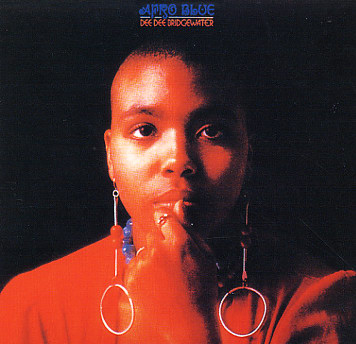
Check out the epic sweep of Afro Blue’s title cut. You think I’m going to listen to some sappy French songs when you’ve got this hunk of joy jumping up and down. And check whose on the side: Cecil Bridgewater – trumpet and kalimba; Ron Bridgewater – tenor sax and percussion; Roland Hanna – piano; George Mraz – bass; Motohiko Hino – drums and percussion. This was top drawer; why settle for French pap, I mean “pop”?
Not that pop is ipso facto a bad thing. Indeed, two other cuts I really, really like on Dee Dee’s debut were jazz versions of pop tunes.
Dionne Warwick has done her light, bubbly thing with “Raindrops Keep Falling On My Head,” light as creamy froth atop cappuccino or whatever they put the froth atop in coffee shops. But, check what Dee Dee does. The arrangement is probably by Cecil, who was her husband at that time (in fact he continues to provide arrangements for Dee Dee). Anyway, she slows the song down to a slow, slow stroll and beautifully digs into the story line.
Dee Dee makes her on-point phrasing sound easy as snapping your fingers but don’t be fooled those slides and glides call for immaculate timing and expert breath control. Masterful.
And back in the mid-seventies “People Make The World Go Round” was showing up on numerous jazz albums. Here it’s fitted with a Coltrane-like vamp, and again Dee Dee’s long tones predominate. I admire vocalists who can maintain pitch and volume while using long tones with micro-tonal shading. Plus you also get a Cecil trumpet solo.
So I had all of this, why try to mess with that Frenchy stuff?
Dee Dee provides an answer I hadn’t expected.
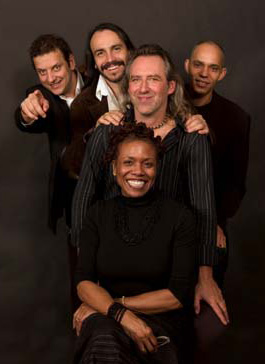
Turns out this is a first class jazz album—not your straight ahead kind of jazz and not smooth jazz either, rather jazz with a Gallic twist. Yes, French pop but sensitively rendered by a band of simpicato musicians who unerringly support Dee Dee’s every vocal pirouette. The band is Louis Winsberg - guitar; Marc Berthoumieux - accordion; Ira Coleman - bass instrument; Minino Garay - drums, percussion.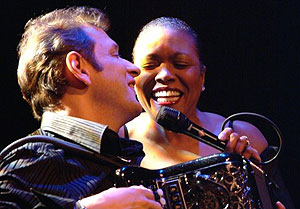
The accordion is beautiful, even sounding, at times, like a jazz harmonica. And surprise, surprise not only did I know all the songs (when I first checked them out I had not peeped the translation of the French titles), I actually liked some of the songs. By the third song I was wagging my finger at myself—don’t let your prejudices prevent you from getting to some hip and sensitive music.
I don’t know how this album will affect those who are not familiar with the songs in either English or French, but hopefully, you won’t take as long as I did to give in to the album and give it a listen.
J’ai Deux Amours is a wonderfully successful concept album. I find myself frequently spinning these covers and enjoying them as though they were hardcore jazz classics. 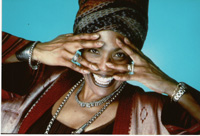
Much of the success is due to Dee Dee’s versatility. Her debut was straight up modern jazz. J’ai Deux Amours is a dramatic, jazz-based interpretation of pop music. And Red Earth over in our Contemporary section is an international African album. Dee Dee Bridgewater is a master vocalist. Her range is exceeded only by her reaching. She is constantly stretching and exploring.
I don’t know of any other contemporary vocalist who has excelled in completely diverse genres as has Ms. Bridgewater, and mind you, we have not yet investigated her Grammy-winning Ella Fitzgerald tribute, her Horace Silver tribute, or her dramatic interpretation of Kurt Weill compositions, not to mention her super-hot live recordings.
Right now we’re not even halfway through some of her major accomplishments, but more on all of that at another time. Right now let’s just enjoy “La Belle Vie.”
—Kalamu ya Salaam
I think I like it
Maybe I'm stuck doing what Kalamu talks about above, but it's hard for me to really get into the J'ai Deux Amours album when I'm comparing it to the music from Red Earth. Part of it is that the ballads and pop tunes of the former are naturally less dynamic than the uptempo, percussion-heavy style of the latter. I do like the the feature track "La Belle Vie" a lot. Dee Dee's performance on "Les Feuilles Mortes" is interesting in part because of how different it is from her more traditional performance of the same song on the 1993 Keeping Tradition CD. Once the band kicks in, I really like the swinging, midtempo arrangement of the newer arrangement. It's very different from the way the tune is usually played. I think I like it. All in all though, I'm still undecided on this album. I'm going to be rocking with Dee Dee's wonderful Red Earth CD for a while. (See this week's Contemporary post for more on Red Earth.) After I let that settle in, I'll come back to these tunes and see how I feel.
—Mtume ya Salaam
P.S. I do have to say now though, that I've never heard an accordion sound like Marc Berthoumieux makes it sound. Kalamu thought he was hearing a harmonica and I have to agree. It almost sounds like Toots Thielman was sitting in with Dee Dee's band.This entry was posted on Sunday, September 9th, 2007 at 2:29 am and is filed under Cover. You can follow any responses to this entry through the RSS 2.0 feed. You can leave a response, or trackback from your own site.
Leave a Reply
| top |